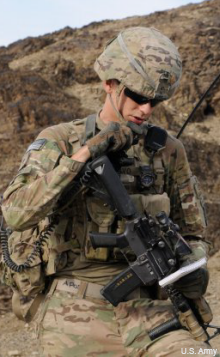Army gives 4 companies contracts for Soldier Radio Waveform systems
The companies will supply SRW-Appliqué systems to extend tactical communications in the field.
The Army has given awards to four companies for five different field radios under its contract for Soldier Radio Waveform (SRW) Appliqué radio systems.
Each of the companies—Exelis Inc., General Dynamics C4 Systems, Harris Corp. and Thales Defense & Security—were awarded a basic contract under the multiple award, indefinite delivery/indefinite quantity contract, and will compete for future orders, the Army said. The overall contract, for five years with five one-year options, has a ceiling of $988 million dollars.

Each company had earlier received an initial award of about $115,000 per radio to take part in the Army’s Network Integration Evaluation 14.2 scheduled for this month.
The Army sees SRW-Appliqué as critical to extending mobile tactical communications down to the dismounted soldier. The single-channel radios will be installed on vehicle platforms where two-channel systems, such as the Army’s Manpack radios, aren’t required. The Army expects to make the radios available beginning with its network Capability Set (CS) 16.
Earlier NIEs, which are semi-annual exercises to test the Army’s field networking and collect feedback from soldiers, confirmed the need for SRW- Appliqué, the Army said. NIE 14.2 will focus on risk reduction. A full operational assessment will be made at a future NIE.
A radio running SRW can be installed into the Single Channel Ground and Airborne Radio System on a vehicle, providing a second channel for voice and data communications between dismounted soldiers, mounted units and commanders.
The SRW- Appliqué systems being offered are: Exelis’ NSA-certified SideHat; Thayles’ VIPER (for AN/VRC‐121 Vehicle Integrated Power Enhanced Rifleman); General Dynamics’ SRW-Appliqué, which combines a Rifleman radio with a 20-watt Manpack radio power amplifier; and two systems from Harris that consist of Falcon III wideband radios and small wideband power amplifiers.
The systems are designed to be small, light and relatively inexpensive, and the Army said the nature of the contract will encourage innovation. "This approach will enable the Army to maintain a competitive environment and encourage further technical progress while meeting CS fielding needs," said Col. Russ Wygal, the Army's project manager for tactical radios.



